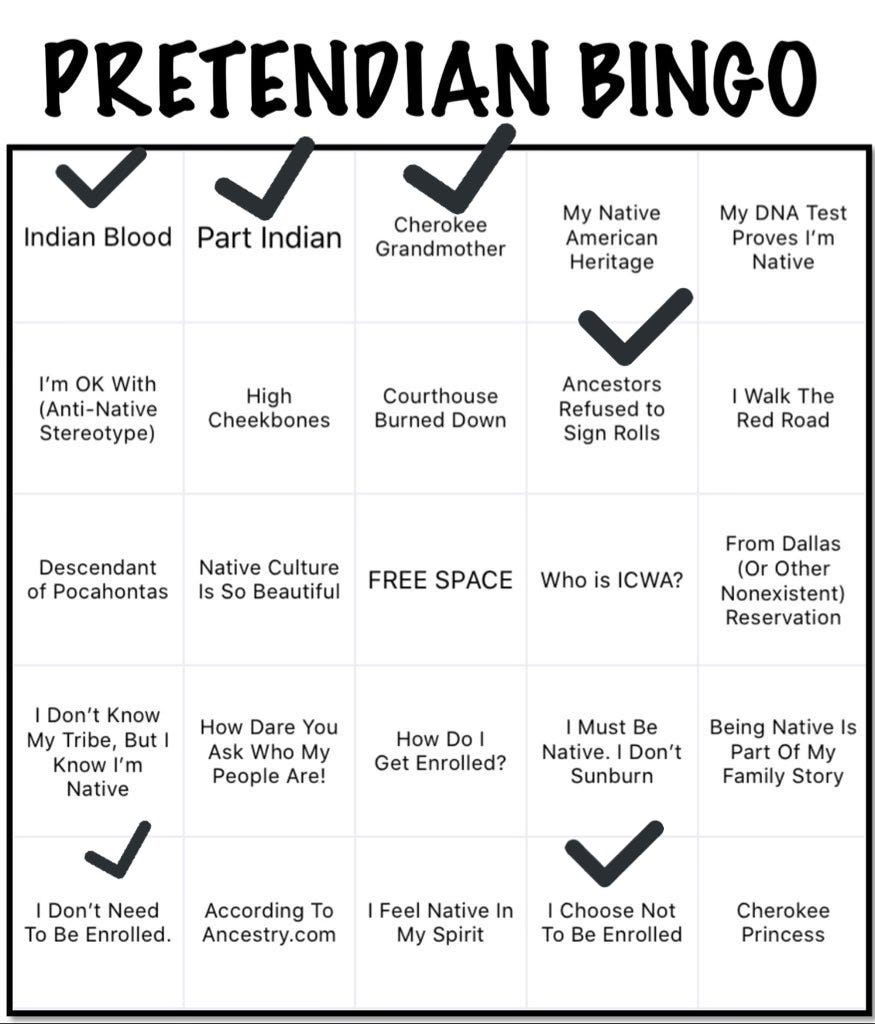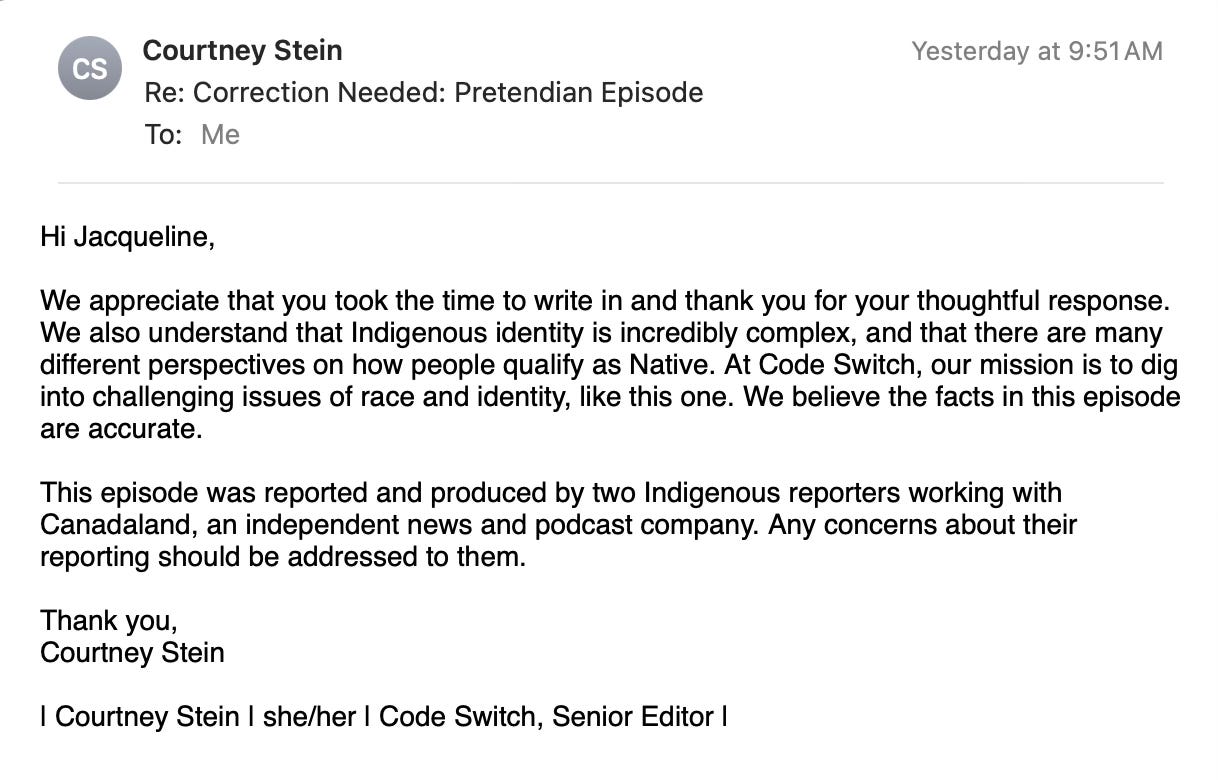Yesterday, I finally received a response from NPR Code Switch senior editor/ showrunner Courtney Stein regarding the show's rebroadcast of a Canadaland podcast that defamed me two weeks ago. She is one of many at the public radio broadcaster. I emailed requests for correction, and many of you did, too. Your collective efforts in this matter are invaluable in demanding accountability.
I am very disappointed in NPR Code Switch's rebroadcasting across the United States during Native American Heritage Month, a poorly reported Canadian podcast attacking an American Indian journalist's work exposing people monetizing American Indian identity in the United States. They did not seek comment from me to allow me "to respond to criticism or allegations of wrongdoing," as required by the SPJ's Code of Ethics, regarding claims in the podcast that I stalked or targeted individuals or that my work is a "hit job" on people I dislike.
The episode has never been corrected despite repeated emails since June (when it originally aired in Canada). This delay in fixing the record is not just a matter of journalistic ethics—it's an urgent matter. The longer this misinformation is allowed to stand, the more it gravely harms the efforts to hold opportunists falsely claiming to be American Indians in the United States accountable. We cannot afford to let this continue.
As I detailed in two Substack posts (When NPR Attacks a Native Woman During Native American Heritage Month, FAQ: NPR and Defamatory Coverage of Investigation of Pretendianism) on NPR's coverage of my work, NPR Code Switch's reporting harms efforts to hold opportunists falsely claiming to be American Indians in the United States accountable. As a federally funded nonprofit, NPR must uphold the trust relationship the US federal government has with federally recognized tribes like the Pamunkey –– not undermine their sovereignty by featuring coverage that unquestionably supports people the Pamunkey find falsely claiming to be tribal members.
NPR Code Switch Senior Producer Passes the Buck
Her response does not address factual reporting errors:
I never retracted my findings. I still consider Kiros Auld and his family Pretendians.
The Pamunkey Tribe does not accept Auld as a Pamunkey or as a descendant. They do not state who these Pamunkeys who accept him are and do not ask the tribe for comment. This correction was not included when it was given after the initial broadcast. The Pamunkey Tribe's stance on Auld's identity is a significant factor in this case.
I do not threaten Pretendians or their families; I seek to verify stated, on-the-record claims of tribal identity. They provided no proof of such allegations, broadcast them, and never allowed me to respond.
The investigation is not a 'hit job' on people I dislike. I have clearly outlined how the Alleged Pretendian List came to be in interviews and articles. It was a joint effort by many Native professionals who added to the Google Doc suspected ethnic frauds in their respective fields, a collaborative effort to identify individuals who falsely claim Indigenous identity. This list is a key tool in our efforts to hold such individuals accountable, making the need for accurate reporting even more critical.
Courtney Stein needs to revisit the Society of Professional Journalists (SPJ)Code of Ethics. Upholding these ethical standards is not just a suggestion, it's essential for credible journalism.

NPR still needs to practice Journalism 101, which includes seeking comment. This is a basic rule and a necessary step in ensuring balanced and fair reporting. Upholding journalistic integrity is not just a choice, it's a responsibility.
Do these podcasters want to be the go-to source for investigating Pretendians? Yet, they backpedal on respecting tribal sovereignty and the right of tribes to determine their membership to push their claim that I was inaccurate in my finding that Mr. Auld is engaged in Pretendianism. Falling back on 'American Indian identity is complicated' is deploying the standard Pretendian defense. I think it's even on the Pretendian bingo card, a metaphorical card that lists common excuses or defenses used by individuals who falsely claim Indigenous identity.

NPR also shares responsibility for the reporting since NPR Code Switch team members added their names to the byline of the renamed episode (originally titled Pretendian Hunters). As this Poynter Institute for Media Studies article explains, "The news story byline personalizes the report so readers know someone is responsible for what’s reported and written. It allows readers to hold someone accountable for the story. In essence, the byline says, “Believe this information because my name is on it.”" This indicates that NPR Code Switch team members endorsed the episode's content, sharing responsibility for its accuracy and fairness.
I am still seeking a retraction and correction. Stein sent this same boilerplate email to other people who sent emails on my behalf. However, Pamunkey Chief Robert Gray had received no email as of this morning when I texted him. As I reported earlier, he had received a phone call from the senior editor/showrunner a few days after the NPR Code Switch episode aired in response to his email. It is crucial that this mistake is rectified.




